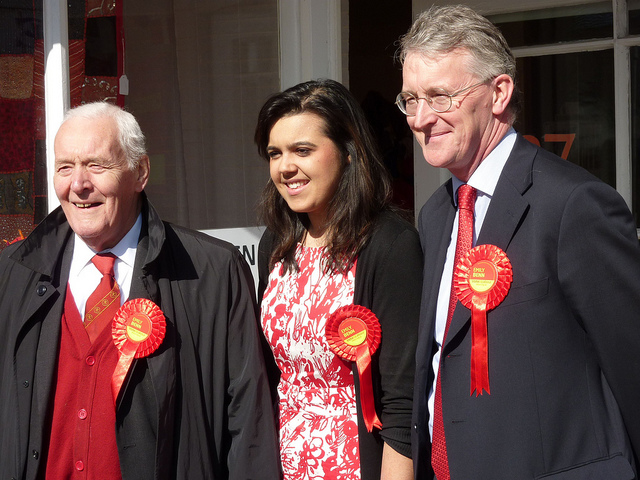Political dynasties have featured prominently in British political history, but are declining in value
The death of Tony Benn, third of four generations of his family to sit in the House of Commons, and the selection of Stephen Kinnock, son of the former Labour leader, as a candidate for the next general election, has thrust the spotlight onto political dynasties. Alun Wyburn-Powell shows that historically dynasties have been highly significant in shaping political outcomes, but that they are declining in value as time progresses.
A political dynasty can be defined as a succession of people from the same family who play a prominent role in politics. But are political dynasties what they used to be and what exactly is passed from generation to generation?
The only thing which is inevitably passed from one generation to the next is DNA. This alone can have a significant influence on someone’s life and career. Tony Benn’s ancestors, including his father, were generally long-lived. Knowing this, when he was young Tony Benn was able to write confidently that he expected to live to 82. He did in fact manage nearly another seven years on top of this. Tony Benn and Denis Healy, whose father lived to 92, shared this optimism, even if they did not agree on everything else. They did not need to be young men in a hurry to achieve everything they wanted. Contrastingly, Enoch Powell believed that he was going to die in the Second World War and made no plans for his subsequent career.
The most recognisable aspect of a political dynasty is usually the name. The Benn and Kinnock names are unusual and distinctive. They are recognised internationally. But names can change. As quite a few will remember, Tony Benn’s father became the first Viscount Stansgate. Fewer would realise that Robert Gascoyne-Cecil was the same person as Viscount Cranborne, or that he is now known as the seventh Marquess of Salisbury. He is the great-great grandson of the Conservative prime minister at the turn of the 20th century. His family has at least been consistent with first names – four of the last five generations of title holders being called Robert. Tony Benn’s (disused) middle name of Wedgwood originated from his grandmother’s uncertain belief that the family was related to the eponymous potters. In fact there was a connection, but it dated back four generations before Josiah Wedgwood, who opened the pottery. Their common ancestors were Margaret Burslem (1594-1655) and her husband Gilbert Wedgwood (1588 -1678) – long lived, especially by the standard of the time.
Churchill famously wanted a Lloyd George and an Asquith in his cabinet in 1951. He succeeded with the former (Gwilym), but failed to persuade Cyril Asquith to sit on the woolsack. Whether a prime minister Miliband would want a Blair and a Brown in his cabinet is perhaps more doubtful and David Cameron will definitely not have a Thatcher and a Heath in his. However tempted (or not) he might be by the idea of Sir Mark Thatcher’s presence, Ted Heath had no descendants.
Earlier generations of political dynasties were often sustained by the inheritance of a seat in the House of Lords, as was the case with the Salisburys. However, for a politician determined on a career in the House of Commons, as was Tony Benn, the inheritance of a peerage was a nuisance – to put it mildly. His early attempt to rid himself of the viscountcy was met with the response that the peerage was ‘a personal dignity annexed to the posterity and fixed in the blood’. Whilst Tony Benn may have had a small amount of clay running in his arteries, he refused to accept that the viscountcy of Stansgate was fixed in his blood or annexed to his posterity. He eventually managed to relieve himself of it by means of the Peerage Act of 1963.
Tony Benn’s eldest son, Stephen has inherited the viscountcy. No longer does this bring an automatic seat in the House of Lords. Under the 1999 rules, a hereditary peer can stand for election only when there is a vacancy among the 90 places reserved for hereditary peers. 42 of these seats are reserved for Conservative supporters, three for Liberal Democrats and only two for Labour. The electorate is limited to other peers. So the inheritance of a viscountcy gives entitlement to stand in such an election, but no more.
A potential asset to be passed between generations is experience. Tony Benn claimed to have the political memory of someone much older than his chronological age, as his father had explained so much of his own experiences, memories and learning from past mistakes. A body of knowledge and experience can be a valuable inheritance, especially among politicians who reach their peak at an increasingly early age.
So, how valuable is membership of a political dynasty these days? It certainly didn’t help Tamsin Dunwoody, who failed to hold her late mother’s seat in the by-election at Crewe and Nantwich in 2008. Instead, it became the first time that the Conservatives had captured a seat from the Labour Party at a by-election since 1978. Nor, did it seem to help David Prescott, who failed to be selected as a candidate to succeed to his father as MP for Hull East. Stephen Kinnock and Will Straw have passed this hurdle, but they still have to convince the voters to elect them. Tony Benn’s granddaughter, Emily, fought and lost a seat in the 2010 election, but at the age of only 24, she probably has time to try again. Tony Benn’s son (and Emily’s uncle), Hilary, was elected as Labour MP for Leeds Central in 1999 and made it to the cabinet.
From a party political point of view, dynastic families are not guaranteed to maintain the loyalties of their forebears. Oliver, son of Conservative prime minister, Stanley Baldwin, became a Labour MP. The current Earl Attlee, grandson of the Labour prime minister, is a Conservative. Tony Benn’s father defected from the Liberals to the Labour Party, largely as a result of his dislike for Lloyd George. In turn Lloyd George’s children, Megan and Gwilym diverged to the Labour and Conservative parties respectively.
International dynastic families are usually to be found amongst royalty, rather than politicians, so the selection of Stephen Kinnock, husband of the Danish prime minister, as a Labour candidate in Wales is unusual. The ‘first gentleman’ of Denmark could become a British MP. He would join a select group, including Graca Machel, widow of both former South African president, Nelson Mandela and of former Mozambican president, Samora Machel. She has thus held the position of first lady of two different countries.
Membership of a political dynasty is certainly declining in value. These days not so many people are desperate for a personal dignity annexed to their posterity and fixed in their blood. Toil, sweat and tears are more valuable currencies in British politics.
—
Note: this post represents the views of the author, and not those of Democratic Audit or the LSE. Please read our comments policy before posting. The shortened URL for this post is: https://buff.ly/1kio2im
—
 Dr Alun Wyburn-Powell is currently writing the biography of Tony Benn’s father, William Wedgwood Benn, first Viscount Stansgate. His previous book was Defectors and the Liberal Party 1910 to 2010. He can be found on Twitter at @liberalhistory.
Dr Alun Wyburn-Powell is currently writing the biography of Tony Benn’s father, William Wedgwood Benn, first Viscount Stansgate. His previous book was Defectors and the Liberal Party 1910 to 2010. He can be found on Twitter at @liberalhistory.






 Democratic Audit's core funding is provided by the Joseph Rowntree Charitable Trust. Additional funding is provided by the London School of Economics.
Democratic Audit's core funding is provided by the Joseph Rowntree Charitable Trust. Additional funding is provided by the London School of Economics.
foot ball blog
Political dynasties have featured prominently in British political history, but are declining in value : Democratic Audit UK
air max 95
Hi there, i read your blog from time to time and i own a similar one and i was just curious if you get a lot of spam remarks? If so how do you prevent it, any plugin or anything you can recommend? I get so much lately it’s driving me mad so any assist…
Political dynasties are no longer as important as they used to be. https://t.co/5CmqC6w61x
Why political dynasties aren’t quite what they used to be. https://t.co/tQsMqX0NQS
What is actually passed down through the generations of a political dynasty? https://t.co/tQsMqX0NQS
RT @TimJCarr: UK political dynasties declining in value according to @liberalhistory on @democraticaudit https://t.co/Of1dO53Fhk
ASPol: Is this an issue for social representation in Parliament? https://t.co/soNk3VaLb9”
The value of political dynasties is declining. https://t.co/tQsMqX0NQS
What exactly is passed down the generations of a political dynasty? https://t.co/5CmqC6w61x
RT @democraticaudit A treasure trove of information about political dynasties in today’s DA post by @liberalhistory https://t.co/onkvI6aRe5
A treasure trove of information about political dynasties in today’s DA post by @liberalhistory https://t.co/7BTj82MDqF
Why Tony Benn did not want a viscountcy fixed in his blood and annexed to his posterity. https://t.co/5CmqC6w61x
Political dynasties aren’t what they used to be. https://t.co/5CmqC6w61x
RT @PJDunleavy: Political dynasties have featured prominently in British political history, but are declining in value https://t.co/dngeoP1m…
Political dynasties have featured prominently in British political history, but are declining in value https://t.co/GKIkqauVi2